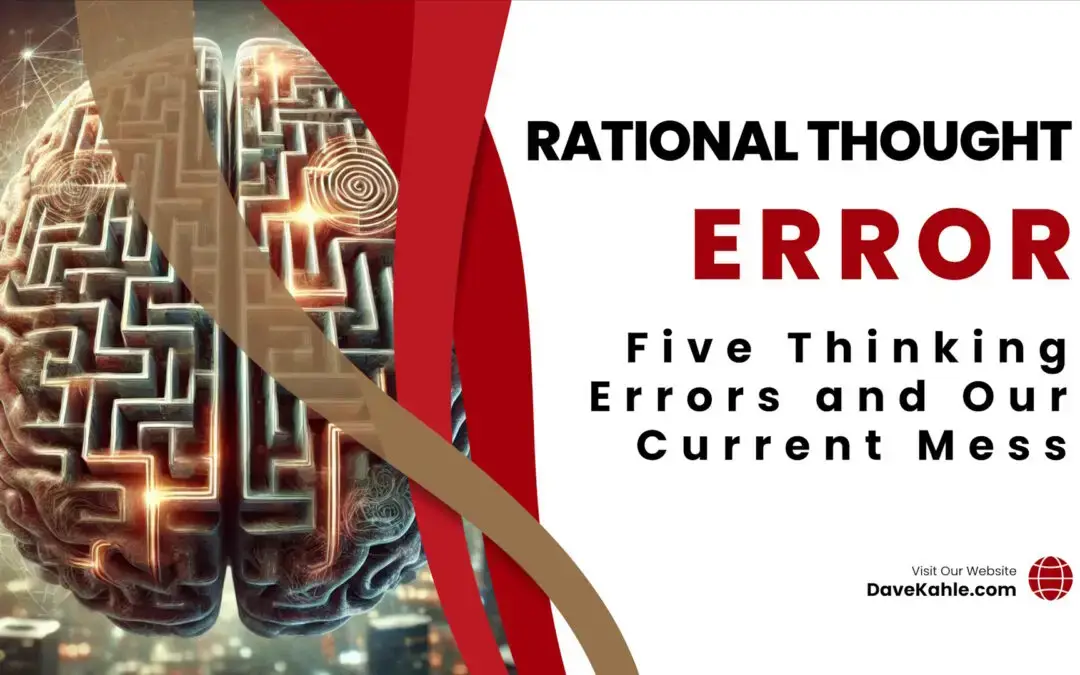Is there anyone who doesn’t recognize that the current state of our country – and the world – is a mess of almost unprecedented proportions? While we can theorize about the causes of this collapse in the collective condition, I’d like to submit one key contributor – we are losing the habit of rational thought.
Whereas for a long time we valued rational thought and respectful discourse, we are rapidly jettisoning those values for more popular substitutes. Since these emerge out of selfish and emotional places, they contribute to a culture that lacks cohesion and which careens toward chaos. Here are five thinking errors which are rapidly becoming common.
1. Hysterical child
This is the characterization that describes people who promote a position prompted solely by fear, the alure of personal attention and/or the quest for power over others. They make emotional assertions that have no basis in reality and repeat them with passion.
Historically, the Salem Witch Trials were perhaps the most graphic example of this. As you may know, a group of young women brought hysterical charges against people without any evidence to support those assertions. For a while, the authorities believed them, but eventually common sense prevailed –but not until a number of people were killed.
I see this most commonly today in social media and among politicians. The mainstream media, because it thrives on notoriety at the expense of evidence, is often complicit in giving these people an audience.
2. Fool
This is the Biblical name for people who don’t learn from experience and believe obvious deceptions. These people continue to make the same mistakes, and hold the same positions, even after they have been proven false. The truth doesn’t matter to a fool, he/she believes what they will, even after it has been shown to be false.
3. Bender
This is the name for people who view reality from a perspective that bends and distorts the truth to fit into a pre-existing point of view. When they do this knowingly, they are crooked. When they do this unknowingly, they are foolish.
Again, the notoriety of social media and the mainstream media provide the motivation for the attention one gathers by loudly proclaiming a bent version of events.
I saw this most graphically a few days ago when some minor political figure claimed that the victims of the Hamas massacre were “fake babies.”
4. Deceiver
These folks make up a story/set of assertions that are designed to influence and motivate people to a set of actions based purely on a fictional narrative. They make up a fictional narrative, and then try to sell it so as to sway people to a position which is ultimately based on imagination.
Examples from the daily newscasts and social media trends are too numerous to mention. This seems like a daily event, with governments and crooks (see above) routinely creating deceptive versions of events. Political parties of every sort, and their mavens, are the most visible proponents of deception. It is so common in political circles that it must be an accepted strategy to be a party member.
One example is the famous dossier linking Trump to the Russians during the 2016 election. It turned out to be a work of fiction, created and paid for by deceivers and crooks.
5. Leaper
Leapers take isolated events, infer a motivation or pattern of behavior from them, and then project it forward to other circumstances and people. While the leaper may be sincere, his/her lack of careful consideration often leads to unsuccessful strategies.
While these thinking errors have always been a part of human culture, in recent years a number of trends have emerged, all of which promote thinking errors. Universities have abandoned their traditional function of teaching students how to think; social media continues to provide an audience for the most bizarre thinking errors; and mainstream media is abdicating its role as objective fact-providers. These are just a few of the more obvious. Combined, they are paving the way toward chaos.
Much of the development of civilization has been the struggle to instill thoughtful, rule-based actions on weighty decisions. In recent years, we’ve taken a step backward, stumbling from rational thinking to chaos.
Related Resources



